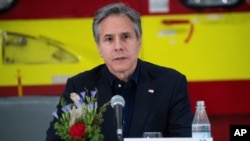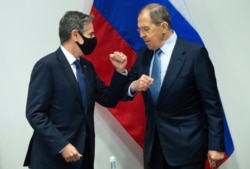Climate change and cooperation among Arctic states were among the topics of discussion Thursday in Reykjavik, Iceland, where the Arctic Council has been holding a ministerial meeting.
“I'm in Greenland because the United States deeply values our partnership and wants to make it stronger,” U.S. Secretary of State Antony Blinken told reporters after the meeting Thursday.
In his last appearance before returning to the United States, Blinken recounted flying over receding ice caps, noting the bleak reminder of the effects of climate change.
“Having the opportunity not just to talk about it, not just to read about it, but to actually see it is very, very compelling,” he said.
Earlier in the week, Blinken urged the global community to avoid militarizing the Arctic, and said Russia has advanced “unlawful maritime claims” in the region.
Russian Foreign Minister Sergey Lavrov said this week that Western countries should not claim rights to the Arctic and that Russia is responsible for ensuring its Arctic coast is safe.
The Arctic dispute is over the so-called Northern Sea Route, a shipping lane that runs along Russia’s Arctic Ocean coast. Russia considers the Northern Sea Route vital to its economic and military interests and requires foreign vessels to obtain permission from Moscow to navigate it. The United States has dismissed Russia’s claims of jurisdiction over parts of the route as illegitimate.
Russia is taking over the chairmanship of the Arctic Council, and has set goals for highlighting sustainable economic development and promoting Indigenous cultures and languages.
On the sidelines of the Arctic Council gathering, the big focus Wednesday was on a meeting between Blinken and Lavrov. It was the first face-to-face meeting for the top U.S. and Russian diplomats and comes at a time of heightened tension between their countries.
European energy security is at the top of the U.S. agenda as Russia's controversial Nord Stream 2 gas pipeline, which connects Russia and Germany, nears completion.
Wednesday, the State Department announced its plan to sanction Russian vessels and entities involved in the building of Nord Stream 2. But the U.S. is waiving sanctions on the company in charge of the project, Nord Stream 2 AG, and CEO Matthias Warnig, a German national, citing U.S. national interest.
The move is seen as a bid to improve relations with Germany. The Biden administration has been seeking to strengthen U.S.-German bonds and the transatlantic relationship.
"I think our actions today have demonstrated that we continue to oppose the pipeline projects but that we also are cognizant of the president's commitment to rebuild relations with our European allies and partners," a senior U.S. official said.
German Foreign Minister Heiko Maas praised the decision.
"We see this as a constructive step which we are happy to further discuss with our partners in Washington," he said Wednesday during a press conference.
VOA Mandarin Service contributed to this report.





